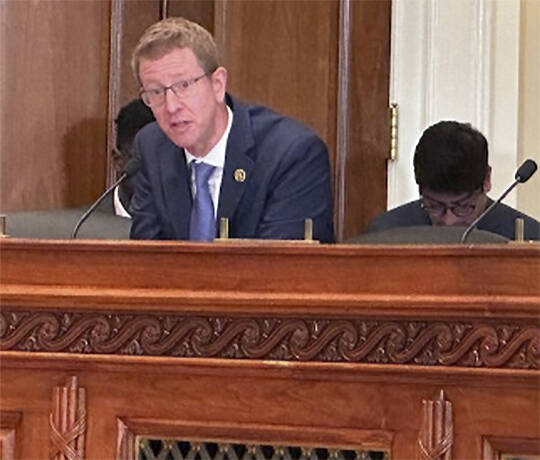Second in a series
Derek Kilmer has only a few months left of his final term in the U.S. House of Representatives, but the lawmaker is showing no desire to go on cruise control until he departs Washington D.C. at the end of the year.
Rather, the Gig Harbor representative said he plans to advance legislation that will benefit local interests like the Puget Sound Naval Shipyard, military veterans and promote housing opportunities. Kilmer also wants to devise a way to keep the House going in the event of mass casualty event among lawmakers – no small feat since it requires a U.S. Constitutional amendment.
“I’m going to sprint to the finish line. I’m really focused on the next eight months and trying to get as many pucks into the net for the folks that I represent as possible,” Kilmer said.
Shipyard
Kilmer reports he is focused on providing decades of funding to improve and expand the naval shipyard under the Shipyard Infrastructure Optimization Program. It supports modernization of the Navy’s four shipyards in order to do maintenance on submarines and aircraft carriers. Ensuring there are not any barriers to continuation of the program is a top priority, he said.
Veterans
Kilmer is also working on two bills to assist veterans, a segment well-represented in Kitsap County. One is focused on providing transitional housing and the other is aimed at reversing a decline in the number of Veteran Administration home loan applications.
Housing
A pro-housing bill – the “Yes in My Backyard Act” – is another of his priorities. “The act is trying to remove barriers to affordable housing construction and increasing housing supply,” Kilmer said.
The legislation would directly help the county, which is facing a housing shortage, Kilmer said. “We had a group of constituents from Kitsap and Pierce counties (in Washington D.C.) yesterday from the Realtor’s Association, and it was one of their main priority bills. They were like, ‘We don’t have any homes to sell. We have a supply program.’”
Disaster plan
Another goal has less to do with Kitsap and more to do with the continuity of government if a large number of members are killed in a mass casualty disaster.
There is not an effective plan in place for the House of Representatives to function if there is a horrific event, Kilmer said, calling to mind incidents like the Jan. 6, 2021 attack on the Capitol and when a train carrying House and Senate Republicans to a retreat collided with a truck in 2018. “If that train had derailed it could have wiped out most of the Republican conference,” Kilmer said.
Under the U.S. Constitution, vacancies in the House must be filled by special election, which takes an average of four months, Kilmer said.
Kilmer’s resolution is to amend the Constitution to require when a new member of the U.S. House is elected that person must list potential five successors in the event the member dies in office. That state’s governor would then pick one of the five to move into the open position until a special election is held for a permanent replacement.
Two-thirds of the U.S. House and Senate would need to pass the resolution. Then, three-fourths of state legislatures would have to ratify the Constitutional amendment.
Kilmer admits those are tough goals in highly partisan times during a presidential election year.



